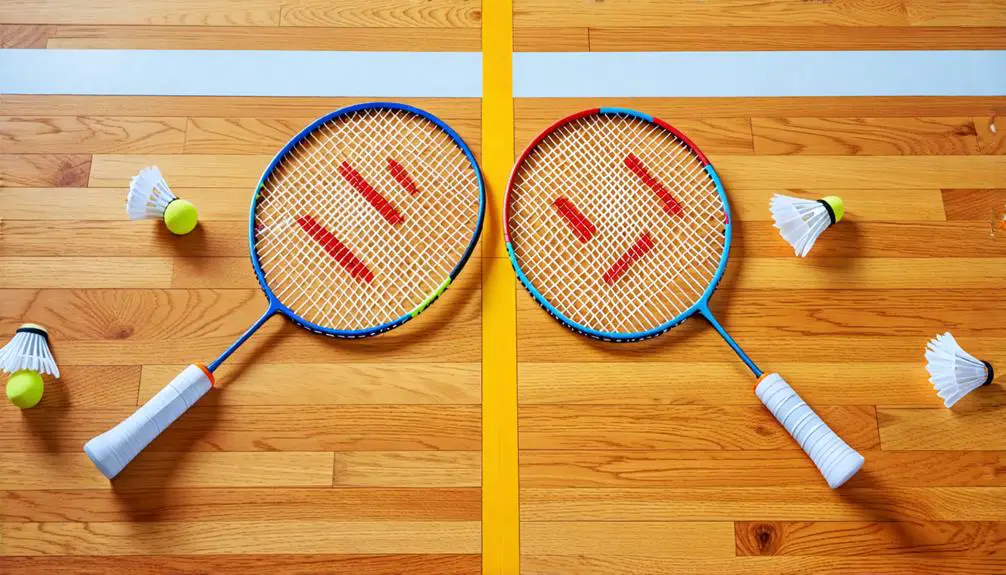A heavier badminton racket isn't automatically better, but it does come with advantages that might suit your style. You'll find it offers more power and stability, which can improve your shot accuracy. However, keep in mind that it may lead to muscle fatigue and strain if you're not careful. If you prefer quick maneuvers, a lighter racket could be a better fit for you. Ultimately, it depends on your playing style and comfort level. Want to explore more about how racket weight affects your game? There's plenty more to discover.
Understanding Racket Weight
When you pick up a badminton racket, its weight can considerably influence your game. The weight of a racket typically ranges from about 70 to 100 grams, and this can impact how you play, your comfort level, and even your risk of injury. Lighter rackets allow for quicker swings and greater maneuverability, which can be particularly beneficial during fast-paced rallies. However, if you're not careful, using a racket that's too light might lead to overexertion, especially if you're trying to generate power on your shots.
On the other hand, heavier rackets can provide more stability and control, but they require more strength to wield effectively. If you choose a racket that's too heavy for your current strength or skill level, you might strain your arm or shoulder, leading to potential injuries. It's essential to find a balance that feels right for you. Pay attention to how the racket feels in your hand—does it feel comfortable, or do you struggle to control it?
Consider trying out different weights to see what suits you best. When testing, keep your safety in mind. Make sure you're in a suitable environment and using the proper technique to minimize the risk of injury. Ultimately, understanding racket weight isn't just about performance; it's also about playing safely and enjoying the game without risking your health.
Advantages of Heavier Rackets
Many players find that a heavier badminton racket offers several advantages that can enhance their game. First and foremost, the added weight can provide you with more power in your shots. When you swing a heavier racket, the momentum generated can translate into greater force behind your smashes and clears. This can be particularly beneficial during competitive play, where every point matters.
Additionally, a heavier racket often provides better stability during contact with the shuttlecock. This stability can lead to more accurate shots, as the racket is less likely to twist in your hand upon impact. As a result, you may find that you can place the shuttle more precisely, keeping your opponents on their toes.
Furthermore, using a heavier racket can help build your strength over time. As you practice with it, your muscles will adapt, leading to improved power and control in your overall game. Just make sure to balance your training with proper technique to avoid strain or injury.
Disadvantages of Heavier Rackets
While there are benefits to using a heavier badminton racket, it's important to contemplate the drawbacks as well. Heavier rackets can bring some challenges that might affect your performance and overall safety. Here are a few disadvantages to keep in mind:
- Increased Fatigue: Using a heavier racket can lead to quicker muscle fatigue, especially during long matches. This fatigue can hinder your performance and enjoyment of the game.
- Strain on Joints: The extra weight can put additional strain on your wrists, elbows, and shoulders. If you're not careful, this might lead to injuries over time, particularly if you're prone to joint issues.
- Reduced Agility: Heavier rackets can slow down your swing speed, making it harder to react to fast-paced shots. This reduction in agility could impact your ability to play defensively.
- Learning Curve: If you're adapting from a lighter racket, adjusting to the weight might take time. This learning curve can be frustrating and might even discourage you from playing.
When weighing your options, consider how these disadvantages might affect your game. It's essential to find a racket that feels comfortable and safe for your play style. Ultimately, the best choice is one that enhances your performance while ensuring your well-being on the court.
Impact on Power and Control
Choosing a heavier badminton racket can greatly influence your power and control on the court. When you swing a heavier racket, the increased mass generates more momentum. This can translate to more powerful smashes and clears, allowing you to hit the shuttlecock with greater force. However, it's important to balance that power with control. A heavier racket can also provide improved stability, which helps you maintain precision during your shots.
Here's a quick comparison of how racket weight affects your gameplay:
| Racket Weight | Power Level | Control Level |
|---|---|---|
| Light (Under 80g) | Moderate | High |
| Medium (80-90g) | Good | Good |
| Heavy (Over 90g) | High | Moderate to High |
As you can see, while heavier rackets can boost your power, they may compromise some control. It's vital to evaluate your playing style and skill level when selecting a racket. If you're a player who relies on finesse and placement, a lighter racket might suit you better. However, if you're looking to release powerful shots while still maintaining a decent level of control, a heavier option could be beneficial.
Influence on Maneuverability
The weight of your badminton racket greatly affects its maneuverability on the court. If you're looking to improve your game, understanding how weight impacts your ability to swing and respond is essential. A heavier racket can provide stability but may slow down your reaction time, making it challenging to execute quick shots. On the other hand, a lighter racket allows for faster movements, which can enhance your overall agility.
Consider these factors when evaluating maneuverability:
- Swing Speed: Lighter rackets enable quicker swings, helping you react faster to your opponent's shots.
- Control: Heavier rackets might provide more control for powerful shots but can limit your finesse in delicate plays.
- Fatigue: Using a heavier racket for prolonged periods can lead to fatigue, increasing the risk of injury.
- Precision: The right weight can help you achieve better precision in your shots, making it easier to place the shuttlecock exactly where you want it.
Ultimately, it's about finding the right balance. You want a racket that feels comfortable and allows you to move swiftly without sacrificing control. Always prioritize your safety; if a racket feels too heavy or cumbersome, it might be worth considering a lighter option. Your comfort on the court can greatly impact your performance and enjoyment of the game.
Suitability for Different Playing Styles
Different playing styles can greatly influence the type of badminton racket that suits you best. If you're an aggressive player who relies on powerful smashes and quick rallies, a heavier racket might feel more stable and give you the control you need to hit those strong shots. The increased mass can help absorb some of the impact, allowing for more consistent performance during intense gameplay. However, keep in mind that a heavier racket might tire you out faster, especially if you play long matches.
On the other hand, if you prefer a more finesse-based style, focusing on precise drops and net shots, a lighter racket could be your best choice. With reduced weight, you'll find it easier to maneuver, which is vital for quick reflexes at the net. This can help you maintain safety during play, as you can respond faster to your opponent's shots and avoid awkward swings that could lead to injury.
For all-court players who blend both styles, consider a racket that strikes a balance between weight and maneuverability. This will give you the versatility to adapt your game as needed. Ultimately, understanding your playing style is significant in selecting a racket that not only enhances your performance but also guarantees your safety on the court. So, take the time to evaluate how you like to play and choose a racket that complements your approach, keeping your well-being in mind.
Skill Level Considerations
For players at various skill levels, selecting the right badminton racket can considerably impact your game. Understanding how your skill level affects your choice is vital for both performance and safety. Beginners may struggle with heavier rackets, which can lead to fatigue or even injury over time. On the other hand, advanced players might prefer the added power that a heavier racket can provide.
Here are some skill level considerations to keep in mind:
- Beginners: Lighter rackets are easier to handle and reduce the risk of strain. They help you develop proper techniques without overexerting yourself.
- Intermediate Players: As you gain confidence, experimenting with slightly heavier rackets can help improve your shot power and control, but it's important to avoid going too heavy too soon.
- Advanced Players: Heavier rackets can be beneficial for generating power and precision in your shots. Just make sure you have the strength and technique to wield them safely.
- Injury-Prone Players: If you've had previous injuries, it's wise to opt for a lighter racket. This can mitigate the risk of exacerbating old injuries while still allowing you to play effectively.
Ultimately, choosing the right racket according to your skill level can make a significant difference in your performance. It's important to balance the benefits of racket weight with your physical capabilities to guarantee a safe and enjoyable playing experience.
Personal Preference and Comfort
When considering a badminton racket, personal preference and comfort play vital roles in your overall performance and enjoyment of the game. You might find that what feels good in your hands can greatly impact your ability to play effectively. A racket that's too heavy might lead to fatigue, while one that's too light may not provide the stability you need. It's all about finding that sweet spot that suits your playing style and physical capabilities.
Here's a simple table to help you think about comfort factors when choosing your racket:
| Factor | Description |
|---|---|
| Grip Size | A comfortable grip reduces strain. |
| Weight | Heavier rackets can tire you out. |
| Balance | Head-heavy for power, head-light for control. |
| Material | Different materials can affect feel. |
When selecting your racket, consider how each of these factors contributes to your overall comfort. You should always prioritize a racket that feels natural in your hands, as this can lead to more confident swings and better shot accuracy. If you're unsure, try out rackets in a store or borrow from friends. Remember, safety is essential, so make sure you're using a racket that won't cause undue stress on your body. Ultimately, the right racket for you will feel like an extension of your arm, enhancing your game rather than hindering it.
Frequently Asked Questions
How Does Racket Weight Affect Injury Risk in Players?
Racket weight can greatly impact your injury risk. If you're using a racket that's too heavy for your strength and skill level, it might lead to strain in your wrist, elbow, or shoulder. On the other hand, a lighter racket can promote better maneuverability and reduce the chance of overexertion. It's crucial to choose a racket that feels comfortable in your hands, allowing you to play safely and efficiently without risking injury.
Can a Heavier Racket Improve My Overall Fitness When Playing Badminton?
Imagine swinging a hefty club instead of a feather-light racket; every stroke feels like a mini workout! Using a heavier racket can indeed amp up your fitness, as it challenges your muscles and boosts endurance. However, be cautious—overdoing it might lead to fatigue or injury. Balance is key; if you're feeling strain, it's better to stick with a weight that feels right for you. Your health and safety always come first on the court!
What Weight Range Is Considered "Heavy" for Badminton Rackets?
When it comes to badminton rackets, a weight of 90 grams and above is generally considered "heavy." However, it's important to remember that what feels heavy to you can vary based on your strength and playing style. If you're not used to heavier rackets, you might find them tiring or challenging to handle. Always listen to your body and consider starting with a lighter racket to guarantee you stay safe while playing.
Do Professional Players Prefer Heavier Rackets Over Lighter Ones?
When it comes to professional players, preferences can vary widely. Some might lean towards heavier rackets for more power and stability, while others prefer lighter ones for quicker maneuverability. It's important for you to find a balance that suits your playing style. Keep in mind that what works for one player may not be safe or effective for another, so always prioritize your comfort and safety when choosing your equipment.
How Do Different Materials Impact the Weight and Performance of Rackets?
When you're choosing a badminton racket, think of it like picking a trusty sword from a knight's armory. Different materials, like carbon fiber or aluminum, affect the weight and performance considerably. Lighter materials can enhance your swing speed and maneuverability, while heavier options may provide more power. It's crucial to find a balance that feels comfortable and safe for your play style, ensuring you can enjoy the game without risking injury.




